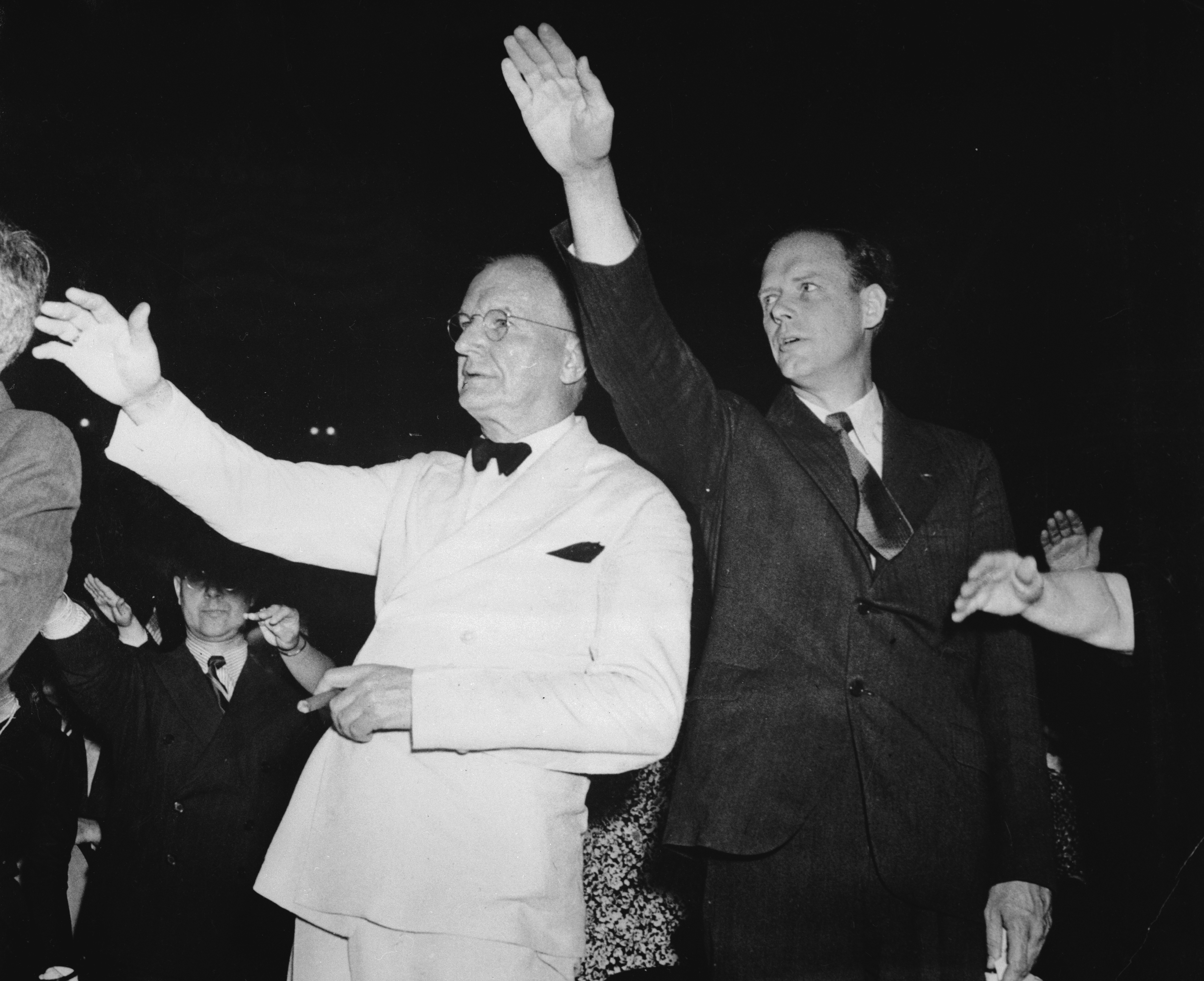'Hitler's American Friends: The Third Reich's Supporters In The United States': Book Review
Review, Norwood on Hart, 'Hitler's American Friends: The Third Reich's Supporters in the United States' (2018) by Bradley W. Hart. Reviewed by Stephen H. Norwood (University of Oklahoma), *Aug. 2019. Long review, but fascinating.
Bradley W. Hart’s Hitler’s American Friends makes a convincing case that during the period from Adolf Hitler’s assumption of power in Germany until the US intervention in World War II, groups sympathetic to Nazism attracted much more support among Americans than most scholars acknowledge. Hart focuses on three of the most important of these groups—the German American Bund, the Silver Legion, and the Christian Front—that promoted a virulent antisemitism almost indistinguishable from that of the Nazis. Hart emphasizes the groups’ broad geographical reach across the country. They drew significant support from two of the nation’s largest ethnic groups, German Americans (especially the Bund) and Irish Americans (the Christian Front). The Silver Legion’s backing came largely from Protestants, the Christian Front’s from Catholics.

Hart also devotes considerable attention to the America First Committee (AFC), the nation’s leading isolationist organization in the years prior to American entry into World War II, whose estimated membership of eight hundred thousand was easily the highest of the groups he discusses. Primarily a conservative isolationist organization, the AFC included some liberal and socialist pacifists and many militant antisemites. The AFC was particularly dangerous to the security of European and American Jewry because it lobbied aggressively against US military and economic support for Britain when it stood alone against Nazi Germany’s war machine, which by the end of June 1940 had overrun most of non-Soviet Europe. In addition, Hart’s work examines how the Hitler government developed relationships with members of the US Congress and congressional staff, and with American university administrators and some faculty members, to present a favorable image of the Third Reich in the United States and even to conduct espionage.
The book begins with one of the most famous antisemitic speeches given in the United States until that time, delivered by aviator hero Charles Lindbergh, the AFC’s “most popular circuit speaker” (p. 2), in Des Moines, Iowa, on September 11, 1941. The speech was broadcast on radio across the country to a sizeable mainstream audience. The nation’s press gave it considerable attention the next day. Lindbergh accused the Jews of using their “large ownership and influence in our motion pictures, our press, our radio, and our government” to push the United States into a disastrous war. He warned darkly of a pogromist backlash if the United States entered the European conflict: the Jews “will be among the first to feel its consequences” (p. 2). Hart quotes New York mayor Fiorello La Guardia’s characterization of Lindbergh’s statements as “a carbon copy of a Nazi paper” (p. 3).
The book includes a chapter on US citizen and pro-Hitler propagandist George Sylvester Viereck, whom Hart identifies as the Nazi government’s “single most important source of US political intelligence” (p. 98). Viereck had been a paid propagandist for the German government during World War I, both before and after US entry, and had backed Hitler since 1923. Shortly after Hitler assumed power in 1933, Viereck began working with the German Tourist Information Office to encourage Americans to vacation in Nazi Germany. This effort was designed to provide the Hitler government with much-needed foreign exchange and expose the visitors to Nazi propaganda. Viereck’s most important accomplishment was developing relationships with members of the US Congress and their staffs that allowed him to obtain inside, and sometimes very sensitive, information about congressional discussions of affairs of concern to the Hitler government. Viereck developed particularly strong contacts with isolationist senators Ernest Lundeen and Burton Wheeler and with Representative Hamilton Fish.
Viereck had German officials arrange for, and fund, the distribution to the American public of massive numbers of copies of isolationist and anti-British speeches by members of Congress. The German embassy in Washington, DC, also financed Viereck’s purchase of Flanders Hall, a book company that he transformed into Nazi Germany’s major publishing house in the United States...Read More,
https://networks.h-net.org/node/28443/reviews/4398217/norwood-hart-hitlers-american-friends-third-reichs-supporters-united

- Senator Burton K. Wheeler, an isolationist (L) & Charles Lindbergh (R) at an 'America First' rally in NY, May 23, 1941.

- Youth camp for the pro- Nazi US organization, the German American Bund in Griggstown, NJ, 1930s.
- Feb. 20, 1939: 20,000 Americans rallied in New York’s Madison Square Garden on George Washington's birthday to celebrate the rise of Nazism – an event largely forgotten from American history. A Night At the Garden uses striking archival fragments recorded that night to transport modern audiences into this gathering and shine a light on the disturbing fallibility of seemingly decent people.
____________
- 'American Nazis in the 1930s,' The Atlantic, 2017
https://www.theatlantic.com/photo/2017/06/american-nazis-in-the-1930sthe-german-american-bund/529185/
https://democraticunderground.com/1017632080
Catcar
(1,356 posts)appalachiablue
(41,188 posts)a book order for it will be soon.
Dawson Leery
(19,348 posts)They were always full of it. Conservatives are.
appalachiablue
(41,188 posts)about. Cons are absolutely full of it.
muntrv
(14,505 posts)appalachiablue
(41,188 posts)czarjak
(11,316 posts)Arne
(2,131 posts)Speaking German and English, I can tell that they think they are supermen
and they want power.
Response to appalachiablue (Original post)
nam78_two This message was self-deleted by its author.
Response to appalachiablue (Original post)
nam78_two This message was self-deleted by its author.